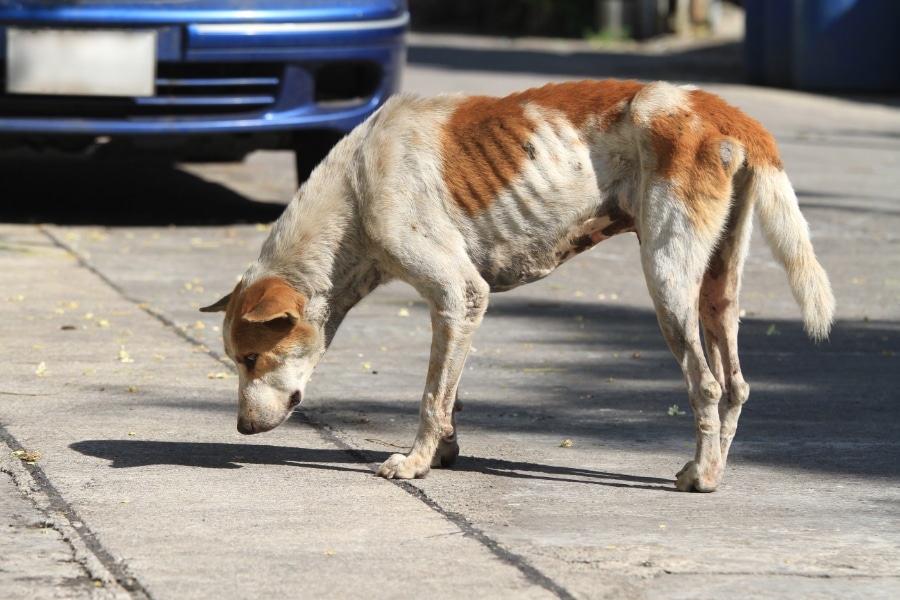Why my dog is losing weight
Is your dog experiencing unexplained weight loss? He may be suffering from a metabolic or digestive pathology, as well as a simple imbalance in his diet.
In both cases, this situation must be taken seriously, on the one hand to avoid the risk of missing a severe health problem, and on the other hand to avoid letting your four-legged friend suffer from nutritional deficiencies that could cause long-term consequences. To determine how best to act when your dog loses weight, I suggest you discover a little more about the main causes and consequences of this phenomenon in our article today.
What is weight loss in dogs?
Weight loss in dogs is simply a decrease in body mass. In other words, your dog loses weight, losing either fat or muscle mass - or both. Weight loss in dogs, whether dieting or involuntary, should always be closely monitored and controlled.
Indeed, a too rapid weight loss (more than 3% of the body mass per month) can cause health problems, or, conversely, be the result of already existing health problems that have been evolving silently for some time. It should be noted, however, that weight changes are normal at certain stages of the dog's life, although they should always be monitored.
Aging animals may have a tendency to lose muscle mass, and young growing dogs, especially large breeds, may suddenly grow very fast, giving them a gangly appearance that suggests - wrongly - that they are too thin. Outside of these situations, sudden or gradual weight loss is never a good sign, and often masks a mild or severe disorder.
Note that it's easy to get the impression that your dog is losing weight when he isn't, especially during shedding, when some dogs (especially northern breeds) lose a very impressive amount of hair. The only way to properly monitor your dog's weight changes is to weigh him regularly, either at home or at the vet's office.
Most veterinarians have a scale in their waiting room, which they leave available to their patients when they are not consulting. So don't hesitate to contact your veterinarian to ask if you can come by and weigh your dog if you suspect he is losing weight for no apparent reason.

Causes of weight loss in dogs
The causes of abnormal weight loss in dogs are extremely numerous and can be due to severe illnesses as well as to a diet that is not adapted to the animal's physical activity.
My dog is losing weight because of his diet
If your dog is an adult in the prime of life and appears to be in excellent health, you should consider the food you feed him. A dog's daily requirements for metabolizable energy vary depending on his age, level of physical activity, condition (spayed or neutered) and many other less obvious factors, such as his mental state - stress has an impact on weight gain.
Moreover, the quality of the diet also plays a role in maintaining a healthy weight. Some foods are not easily digestible, either because of their nature (cereals, fibers, cartilaginous meats...), or because the dog concerned is more sensitive than others and does not tolerate certain ingredients as well. It is also important to know that kibbles are highly caloric than wet food, containing up to five times more calories for a portion of the same weight.
If your dog has recently switched to a wet or mixed diet, it's logical to see him lose weight. The same is true if your dog is exercising more than he used to and you haven't adapted his diet to his new lifestyle. Finally, if your dog has always eaten the same kibble, it is also possible that the manufacturer has changed the composition of its products and that your dog doesn't assimilate them as he used to.
My dog is losing weight as he ages
Dogs can tend to lose weight as they age, especially as they exercise less and lose muscle mass. While this is natural, it can also be a sign of diseases that come with age, such as diabetes, cancer or kidney failure.
However, the aging of the dog's various functions should not appear to be a fatality, and a veterinary consultation is in order as soon as you observe a variation in weight. Indeed, it is quite possible to support the renal, hepatic or cardiac system of an old dog with an adapted diet or a medicamentous treatment in order to give him many more months or years of life in good conditions.
My dog is losing weight due to gastrointestinal disease
Gastrointestinal disease is a common cause of weight loss in dogs, who tend to eat less because of the pain or discomfort of the digestive process. While digestive symptoms may be associated with digestive diseases (diarrhea, constipation, vomiting, etc.), some conditions are silent and require further veterinary examination to be detected and treated.
Among these disorders, we can mention infectious diseases caused by bacteria or viruses, parasitic infections caused by intestinal worms, tumors of the digestive tract, food intolerances or the famous IBD, Chronic Inflammatory Bowel Disease. IBD, still very mysterious at the moment, are autoimmune diseases that cause inflammation of the intestine, which disrupts the assimilation of nutrients and can cause severe digestive disorders.
My dog is losing weight due to a metabolic disease
Some metabolic diseases result in progressive or rapid weight loss. These include chronic renal failure and diabetes, both of which are very common in dogs. Chronic renal failure occurs when a dog's kidneys deteriorate and no longer fully perform their function. Dogs are often lethargic, weak and have digestive problems (vomiting, diarrhea, etc.).
Liver failure, a deterioration of the liver, is also a concern when a dog loses weight for no apparent reason. Chronic pancreatitis, an inflammation of the pancreas, is also a digestive pathology that can make your pet lose weight. Finally, sudden and unexplained weight loss in dogs is one of the typical symptoms of diabetes, one of the most common metabolic disorders in our four-legged friends.
My dog is losing weight due to dental or periodontal disease
Periodontal and dental diseases are formidable enemies of the dog. Particularly frequent in our four-legged companions, they include a group of pathologies that affect his oral health. A dog suffering from periodontal disease (gingivitis, loosening of the teeth, etc.) or dental disease (cavities, abscesses, etc.) may have difficulty eating because chewing can cause discomfort and even severe pain.
In general, a dog with dental or periodontal problems has very bad breath, which is the most common reason for consultation in these situations.

Treatment and prognosis
The treatment and prognosis of a dog losing weight will depend on the origin of this phenomenon and on the animal's health status. If the dog is already very weak, its prognosis will be more reserved, and its management will consist first of all in feeding it again to allow it to gain strength, and even to support a possible heavy treatment.
When the animal is still in good health, the priority will be to quickly look for the cause of its ailments in order to take care of it before its condition deteriorates. If a chronic disorder is diagnosed (pancreatitis, diabetes, renal failure, liver failure, etc.), the treatment and prognosis will be established according to the stage of evolution of the disease and the involvement of the owner in the care of his animal, certain therapies being quite restrictive.
It is essential to note that chronic diseases always offer a better prognosis when they are taken care of early, which is why we highly recommend that you take your dog to a veterinarian as soon as you observe an abnormal weight loss.
FAQ
My dog is losing weight, what should I do?
If your dog loses weight without explanation, it is highly recommended to take him to a veterinarian without delay. Indeed, weight loss is a particularly worrying symptom in adult dogs without any particular health problem. It can indeed reveal a silent chronic metabolic disease (diabetes, liver failure, kidney failure, pancreatitis...), especially when it is not associated with other symptoms.
Why is my dog losing weight?
There are many things that can cause your dog to lose weight, and only a veterinarian can pinpoint the problem. While there is no need to panic, as your dog may simply be suffering from a diet that is not adapted to his lifestyle, it is important not to take this symptom lightly, as it may be a sign of serious illnesses that are common in dogs, such as diabetes or kidney failure.
How do I feed a dog that is losing weight?
We recommend that you consult with a veterinarian to prescribe a therapeutic diet if your dog is inexplicably losing weight. It's also important to get a checkup to make sure there isn't an underlying, silent disease, such as diabetes or kidney failure.
How do I get a dog that is losing weight to gain weight?
It may be tempting to try to fill out a dog that is losing weight, but it is essential to start by doing a health check to find the cause of the weight loss. While it is sometimes possible to fatten up a thin dog with a higher calorie diet, it can be devastating if the weight loss is masking some severe condition, such as liver failure or diabetes.
Weight loss is not a trivial phenomenon in dogs, and it is important to remember that it is always a symptom, not a disease in itself. This means that behind the weight loss there is another, potentially serious condition that needs to be diagnosed and treated properly so that your dog is not put at risk.
Diabetes and kidney failure, which are particularly common among our four-legged friends, are especially to be feared in cases of unexplained weight loss.


